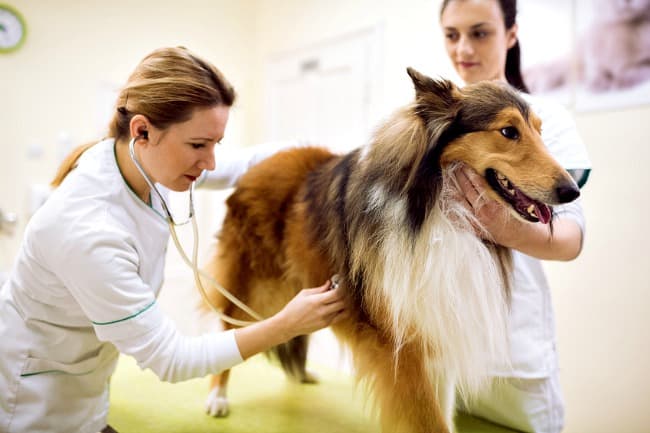FYI: If you buy something through a link on this site I may earn a commission - at NO extra cost to you.
Choosing The Best Dog Insurance
Are you having trouble choosing the best dog insurance health plan for your best friend?
Thousands of other pet owners face the same dilemma every day and I know it's a challenge because I recently had to do it myself.
I've spent a LOT of time researching different pet insurance companies, reading the fine print in their policies, and deciphering the terms and information on their websites.
If you're unclear about how pet health insurance works, or why you need it, check out my Dog Health Insurance Guide and then come back here for a closer look at choosing the best pet insurance options for YOUR dog.

Choosing The Right Pet Health Plan
Although more and more owners are recognizing the benefits of getting their pets covered by a good health insurance plan, many still see this is an 'optional extra' or a luxury.
But, given the rising cost of veterinary care and the amount of money that we spend on our four-legged family members every year, the benefits far outweigh the small monthly premium.

In fact, as a dog owner it's an essential part of your responsibility because your pet is relying on you to keep him healthy and safe, and you don't want to let him down.
Unfortunately, deciding which dog health insurance plan is the best one for your pet isn't as easy as looking for the lowest premium or highest payout limit. There are tons of different factors to consider and a variety of policy options. Here are the most important things to look at:
your dog's age
It's best to get Fido dog health insurance while he's a puppy, before he has any illnesses or is diagnosed with a health condition, both of which would become pre-existing at that point and generally not eligible for coverage.

Healthy puppies who are fully vaccinated (especially mixed breeds who are generally more robust and don't suffer from as many hereditary conditions) and who have routine wellness checks might be able to manage with just accident cover, but of course youth is no guaranteed protection from illness. But if budget constraints are a huge priority this is an option.
Pet health insurance companies each have a maximum age for enrollment and depending on his age your dog may be too old for certain companies to cover. Also, older dogs usually have different health needs and they are more prone to suffer from chronic, hereditary or degenerative illnesses, so a cover that includes these would be best.
potential breed specific hereditary conditions
Every pure breed has a unique range of health conditions to which it is at a higher risk of developing.
If your dog is a Rottweiler, German Shepherd or Labrador Retriever for example, you probably want to look at a company that offers coverage for hip dysplasia. Rotties are also prone to cancers and arthritis, Labradors can be prone to diabetes.
Small breeds may suffer from luxating patellas, vertebrae problems and eye conditions, every pure breed has it's own issues too. So think about this as it applies to your pup's breed and make sure your policy doesn't exclude potential problem areas.
your co-pay
Co-pays are usually between 10% and 30% of the total bill for veterinary services. According to the North American Pet Health Insurance Association, the most popular co-pay amount is 20% (the insurance covers the remaining 80% of the charges).
your Deductible - per year or per incident?
Although the best dog insurance health policies will save you money if your dog gets injured, or develops a serious or chronic health condition, it will still cost you money in the short term.
You pay a monthly premium, a deductible and regular co-pays.
The higher the deductible (what you pay out of pocket before the insurance picks up the tab) the lower your monthly premium.
Some companies have a fixed annual deductible, others a fixed deductible per incident. Most companies now offer an annual deductible and this is usually the preferred option as it can work out less expensive.

If you choose a policy that has a $100 deductible per incident the insurance will kick in after the first $100 payment you make on each individual incident's bill. If your dog goes to your vet two or three times for the same issue/condition you will only pay the deductible on the first visit. However if he goes to the vet two or three times for difference conditions you will pay the per incident deductible each time.
If you have an annual deductible of $200 per year, then you are going to be responsible for paying vet bills in full until you hit that $200 mark (whether it's for the same condition or a different one), then the insurance will kick in. If your first visit bill is for $150, and the second visit is for $50, then you've met your deductible and regardless of WHY your dog needs care (outside of routine care if that's not typically covered) you'll have no deductible to pay for the remainder of the year.
When thinking about this, bear in mind that even for a fairly routine illness visit your veterinary bill is likely to be over $100, if there is diagnostic testing or labs, surgery or other care involved you're liable to be looking at several hundred dollars or more.
pet insurance policy payout limits
Depending on the company/policy you choose there may be a limit to the amount you're entitled to claim per incident, per year, or even over the lifetime of your dog. Once those limits are reached any remaining or future fees are your full responsibility.
If you have a young pup, you probably don't want a lifetime limit because that could be 12 - 15 years (or even more) from the time you sign up. If possible NO limits at all is preferable, but obviously you have to balance that against the other terms and conditions of the policy you're looking at.
payout basis
Some companies will pay a straight percentage of the actual veterinary charges that appear on your bill, others have a 'Benefit Schedule' to work from.
This means that there's a preset maximum $$ amount allocated for particular conditions/injuries etc. and that's what your reimbursement will be calculated against, not your actual bill. Obviously that means that the real-life payout may not be the percentage of your bill that you were expecting.
Where you live
Pet health insurance policies can be affected by the state you live in, and the cost of veterinary care varies from region to region.

If you live in a big city such as New York or Los Angeles, chances are your vet bills are going to be higher than those of pet owners living in rural areas, particularly in the Midwest and Central region of the US.
research is important!
It's really important to take the time to do your research, shop around and get quotes from a number of different pet health insurance companies so that you can compare costs, coverage, exclusions etc.
All major companies will give you free, no obligation quotes, and have informative websites which can help you through the whole process.
Making sure that you choose the best dog insurance policy for YOUR best friend is worth a little time and effort because it could literally be a lifesaver one day.
There are many options today when it comes to pet health insurance. Here are a few of the most popular and established companies in the USA You might want to use as a starting point:
- AKC Pet Health Insurance
- Embrace Pet Health Insurance
- Healthy Paws Pet Health Insurance
- Trupanion Pet Health Insurance
You can find tips and advice on the questions to ask, and things to consider when choosing a pet health insurance policy in my FREE PDF Pet Dog Health Insurance Questions.
Common Veterinary Procedure Costs
If choosing the best dog insurance for your pup is starting to look a bit pricey, and you're thinking that maybe you could just take your chances and pay out of pocket if your little one gets sick or injured, these figures might make you think again.
Here are a sample of average veterinary charges for a variety of fairly routine procedures, diagnostic tests and routine treatments as of 2017:
- X-rays... $100 - $500
- MRI... $2500+
- Ultrasound... $50 - $500
- Endoscopy... $800 - $2000
- ECG... $25 - $100
- Heartworm test... $45 - $60
- Fecal exam... $25 - $45
- Dental cleaning... $70 - $400
(Sources: docshop.com and carecredit.com)

Repairing something as relatively simple as your dog's broken leg could cost anywhere from $2,000 to $5,000 depending on the degree of damage, size of your dog etc.
The surgery itself may be quite a bit less than this figure, but there are X-rays, anesthesia, pre-op bloodwork, monitoring post-op, pain-killers etc. added in.
Major conditions such as diabetes, cancer, cruciate-ligament injuries, hip-dysplasia surgery, hyperthyroidism, luxating patellas, leukemia and more often cost thousands upon thousands of dollars. Especially when they're chronic conditions.
Here are a sample of average, estimated vet bills for some of these according to petcarerx (bear in mind for chronic conditions these costs may be over a period of several years of ongoing treatment)....
- Leukemia.... $10,000+
- Hip Dysplasia.... $4,000 - $7,000+
- Diabetes.... $10,000+
- Ectropion/Entropion.... $2,000 - $4,000
- Legg-Perthes Disease.... $6,000 - $8,000
- Patellar Luxation.... $4,000+
- Bloat (GDV).... $3,000 - $4,000
- Cruciate Ligament Injury.... $5,000+
- Pancreatitis... $400 - $1000
- Ingestion Of Foreign Body.... $1,000 - $3,000+
- Heartworm Treatment.... $1,000+
2017 estimates for dog cancer treatments (according to carecredit.com) include:
- Chemotherapy... $6,000 - $10,000
- Radiation... $5,000 - $7,000
- Surgery... $2,500 - $6,000
- Bone marrow transplants... $15,000
From personal experience I can also tell you that it can cost around $3,000 or more to treat (and if you're lucky, save) your puppy if he contracts Parvo and removing porcupine quills from his face could set you back $600 (yes, really!).
Even fairly minor infections or procedures are rarely less than several hundred dollars.
Most of us besotted dog owners don't think twice about buying the best dog food for our pet.. or a luxury dog bed, the best, most expensive toys and treats and so much more.
However, the concept of spending money on dog medical insurance doesn't always seem so important. The best dog insurance doesn't have to break the bank, and there are some affordable options which could literally save your dog's life one day.
I really hope that the information and advice I've put together has helped to show you just how important it is to make sure your pooch is covered by a pet insurance policy, and how to choose the best policy for your needs.
you might also like...
- Home
- Dog Health Information
- Dog Health Insurance Guide
- Best Dog Insurance
FTC Disclosure: Some pages on this site contain affiliate links. I may earn on qualified purchases.





